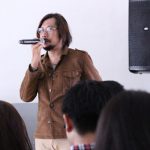Jakarta – Pemerintah menyatakan komitmennya untuk memfasilitasi pengembangan ekosistem musik Indonesia. Sebab, pemerintah memiliki kewajiban meneruskan pemajuan musik di negeri ini.
“Membangun ekosistem musik ini penting, kami siap memfasilitasi,” ujar Ahmad Mahendra, Direktur Perfilman, Musik, dan Media Baru Kementerian Pendidikan dan Kebudayaan (Kemendikbud). Modal utama direktorat yang baru terbentuk tahun ini tersebut, kata Mahendra, ialah mendengarkan dan memfasilitasi para pegiat musik.
Ia menyatakan komitmen itu dalam diskusi “Menyusun Tonggak Sejarah Musik Indonesia” yang diadakan di M Bloc Space pada Selasa, 10 Maret 2020. Diskusi tersebut adalah bagian dari rangkaian acara perayaan Hari Musik Nasional yang diselenggarakan Kami Musik Indonesia (KAMI), inisiatif bersama Koalisi Seni dan Yayasan Ruma Beta.
Mahendra memaparkan, Presiden Joko Widodo telah berjanji bakal meneruskan pemajuan musik Indonesia. Ini dilakukan melalui lima cara. Yakni, perlindungan hak cipta, sistem pendataan terpadu, peningkatan apresiasi dan literasi musik dalam pendidikan, peningkatan kesejahteraan musisi, dan penyiapan infrastruktur pendukung.
Adapun fokus kegiatan pengembangan musik Direktorat Perfilman, Musik, dan Media Baru Kemendikbud ada enam. Pertama, penguatan, perlindungan, dan advokasi hak kekayaan intelektual dalam sektor musik. Berikutnya, pemajuan sumber daya manusia musik melalui sertifikasi musisi berdasarkan Standar Kompetensi Kerja Nasional Indonesia (SKKNI) dan Standar Kompetensi Global. Ketiga, sistem pendataan melalui Data Pokok Kebudayaan yang dilakukan Sekretariat Direktorat Jenderal Kebudayaan. Kemudian, peningkatan literasi melalui kajian dan pemetaan literasi musik. Sebagai upaya diplomasi budaya di tingkat global, pemerintah juga berniat menjadikan negeri ini sebagai referensi musik dunia (world music) melalui penyelenggaraan acara musik Indonesia tingkat internasional, yang pada tahun ini rencananya diadakan di Bali. Keenam, pemerintah ingin menghidupkan dan mendorong makin banyaknya lagu anak yang sesuai dengan tumbuh kembang anak-anak Indonesia.
Mahendra mengatakan, dalam pengembangan musik, direktoratnya akan berbagi tugas dengan Kementerian Pariwisata dan Ekonomi Kreatif. “Harus sama-sama, agar hulu dan hilir satu konsep,” ucapnya.
Sementara itu, Nyak Ina Raseuki, Direktur Pascasarjana Institut Kesenian Jakarta, menyoroti kekuatan musik Indonesia. “Keanekaragaman adalah ciri musik Indonesia, yang mengikuti struktur dan perubahan masyarakatnya,” ucap etnomusikolog yang akrab disapa Ubiet itu.
Ia menjelaskan, dengan berbeda-bedanya perkembangan masyarakat di bagian-bagian negeri ini, ada begitu banyak jenis musik bisa hidup. Ragam musik dari berbagai wilayah dunia memperkaya musik Indonesia sejak dulu. Musik dari Persia, India, Cina, dan Eropa bercampur baur dengan musik etnik.
Namun, banyak di antara kita yang kurang tahu tentang ragam musik di daerah lain, sehingga pertukaran pengetahuan ini perlu lebih didorong. “Orang Jawa tahunya hanya musik yang lazim di Jawa, anak Kalimantan tahunya musik di sana. Mungkin kita tidak tahu juga apa yang terjadi dalam musik di bagian timur Indonesia,” ucap anggota Koalisi Seni tersebut.
Pembicara lainnya, Oscar Motuloh, membahas kaitan musik dengan politik, terutama masa menjelang dan awal-awal kemerdekaan. Sayangnya, kata jurnalis foto itu, kini banyak artefak sejarah yang rusak akibat kurang baiknya pengelolaan oleh pemerintah. Misalnya, biola WR Supratman, pencipta Indonesia Raya, yang dihibahkan keluarga ke Museum Sumpah Pemuda. “Juga piringan hitam Indonesia Raya yang diproduksi pertama kali setelah kemerdekaan, tahun 1959 dan diterbitkan Lokananta. Kalau melihat kondisi master rekamannya di Lokananta, sebaiknya dikonservasi secara lebih baik,” tuturnya.
Wendy Putranto dari M Bloc Space menyarankan agar pemerintah mewujudkan janjinya membangun infrastruktur musik yang layak secara merata di berbagai daerah. “Musisi perlu touring circuit di Indonesia untuk tampil. Live show itu pendapatan utama musisi, baru setelahnya royalti dari platform streaming,” ucapnya.
Ia juga menyarankan agar pemerintah bisa lebih konsisten dalam mengembangkan musik. Sebab, dulu Kemenparekraf telah membuat cetak biru pengembangan musik 2015-2019. Namun, pada 2015 pemerintah memisahkan pengelolaan ekonomi kreatif ke Badan Ekonomi Kreatif (Bekraf). Tahun lalu, pemerintah malah melebur balik Bekraf ke Kemenpar, sehingga kembali ke Kemenparekraf; sedangkan Kemendikbud justru membentuk direktorat baru yang ikut mengurusi bidang musik.
Candra Darusman, musisi yang menjadi moderator diskusi ini, menyimpulkan tiga hal penting. “Pemerintah punya kewajiban memfasilitasi, seniman memberi jiwa, sedangkan swasta membantu lewat CSR (corporate social responsibility)”, katanya menutup diskusi.
Unduh siaran pers ini di sini.



